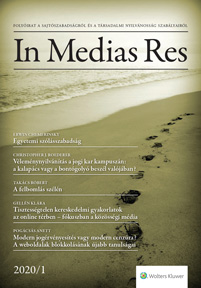The constitutional situation and role of fake news in influencing the democratic public sphere
Abstract
Fake news (noun): False reports of events, written and read on websites. The definition by the Oxford Dictionary is sufficiently concise and to the point, but this short combination of words raises serious constitutional and media law problems in itself. The issue of fake news is closely linked to politics, the media and social media, but nowadays it has become one of the defining issues of constitutional democracy itself. Fake news, the untrue statement of fact, does not in itself fall outside the framework of speech protected by the constitutional principles of freedom of speech, but its negative impact on democratic processes is indisputable. While it would be an exaggeration to say that an online disinformation campaign could decide the outcome of an election, it is already clear that unless a suitable solution to the problem is found, public debates based on factual information that foster democratic public opinion will be almost impossible. The present study examines the effects of fake news on the democratic public sphere, mainly as regards freedom of expression and social media. It will analyze the emergence of fake news and the reinforcing effect of social media, the constitutional protection of false statements of facts in public debates and the attempts that have been made to suppress fake news.
Downloads
Published
How to Cite
Issue
Section
License
Copyright (c) 2020 János Tamás Papp

This work is licensed under a Creative Commons Attribution 4.0 International License.


